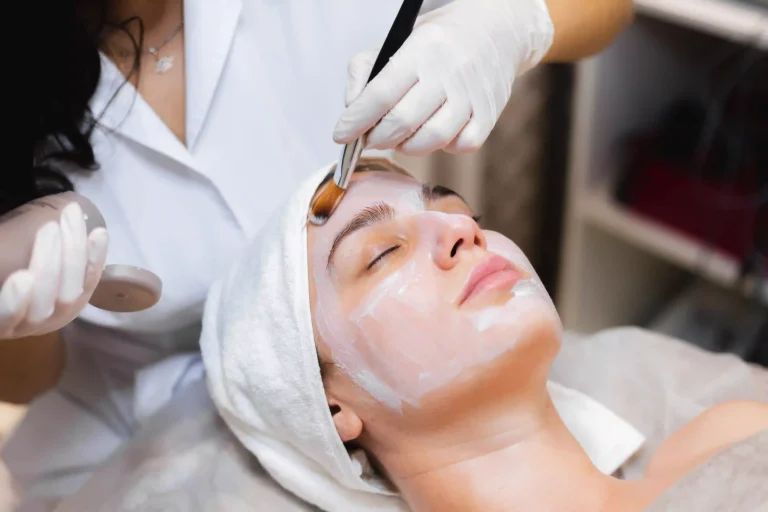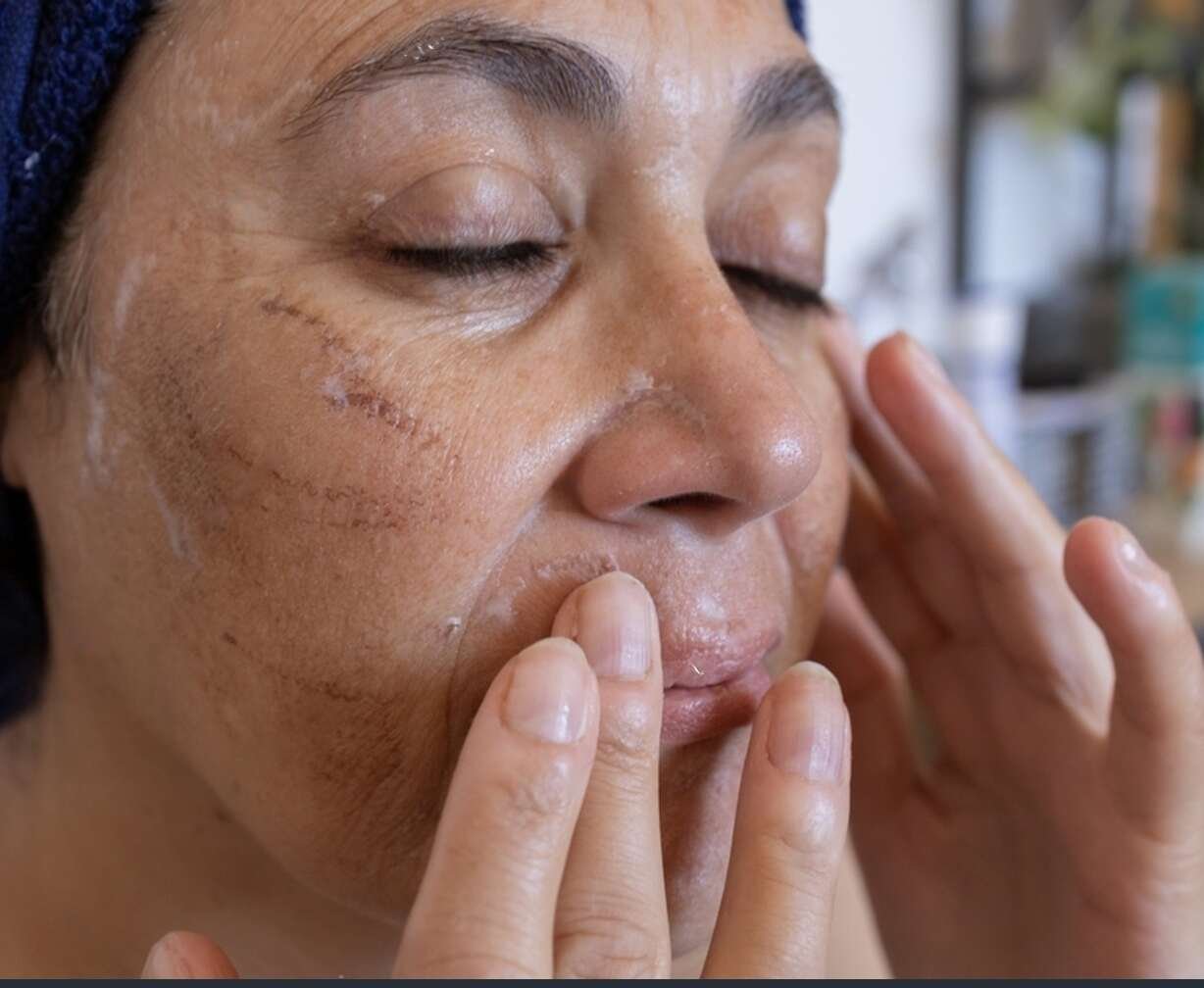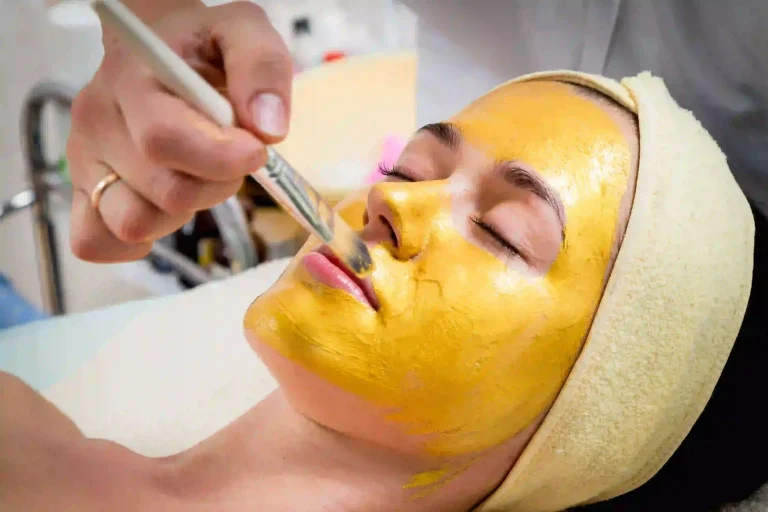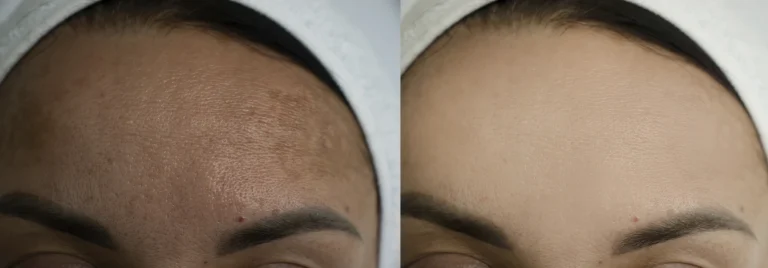Skin Peels: Chemical & Enzyme Peels | DermaVue Dermatology Clinic
Experience Deep Renewal
- Chemical peels utilize acid solutions for deeper exfoliation to remove dead skin cells.
- Customizable Intensity: From light, medium to deep – peels are tailored to address individual skin concerns.
- Accelerated Cell Renewal: Encourages new skin cell growth, revealing healthier, more radiant skin beneath.
- Corrects pigment disorders like hyperpigmentation and melasma.
- Smoothens fine lines and superficial scars.
- Diminishes certain types of acne.
- Reduces age spots, freckles, and dark patches due to pregnancy or taking birth control pills (melasma).


about the service
Unveil Radiant Skin: The Essence of Enzyme Peels
- Natural Catalysts: Uses enzymes from fruits (like papaya or pineapple) or fungi to accelerate the natural chemical reactions in your skin that renew the skin while maintaining complete safety.
- Surface-level Resurfacing: Breaks down the keratin proteins between dead skin cells, a gentler alternative to chemical peels.
- No Downtime: Ideal for individuals seeking improved skin texture without the recovery time.
- Promotes smoother, younger-looking skin.
- Enhances skin elasticity and tone.
- Suitable for sensitive skin types, including those with rosacea or acne.
How does skin peels work ?
Chemical Interaction: Skin peels use chemical solutions, like alpha-hydroxy acids (AHAs), beta-hydroxy acids (BHAs), or enzymes, which react with the skin.
Exfoliation: These chemicals break down the bonds between dead skin cells, facilitating the exfoliation of the outermost layer of skin.
Stimulation of New Cells: By removing the outer layer, peels stimulate the regeneration of a new layer of skin with improved texture and tone.
Collagen Production: Certain peels promote collagen production, essential for skin elasticity and reducing the appearance of wrinkles.
Unclogging Pores: Acids in the peels, like salicylic acid, penetrate and unclog pores, reducing acne and improving skin clarity.
Targeting Pigmentation: Peels can target and diminish the appearance of hyperpigmentation and uneven skin tones by removing the outer layer with these issues.
pH Adjustment: The acidic nature of peels helps balance the skin’s pH, making it less prone to bacterial infections and acne.
Enhanced Absorption: Post-peel, the skin is more receptive to skincare products, allowing for deeper penetration and efficacy of treatments.
Assorted Peels Selections
What are the types of skin peels available?

Glycolic Acid Peel: Derived from sugar cane, this AHA peel is effective for treating fine lines, acne, blackheads, dullness, and oiliness. It's popular for its ability to rejuvenate and brighten the skin.

Salicylic Acid Peel: A BHA peel ideal for oily and acne-prone skin. It helps in unclogging pores, reducing oil secretion, and combating acne-causing bacteria.

Lactic Acid Peel: Derived from milk, this AHA peel is gentler and suitable for sensitive skin. It's effective in improving skin texture, hydration, and reducing pigmentation.

TCA (Trichloroacetic Acid) Peel: This deeper peel helps in treating more significant skin issues like deep wrinkles, scars, and significant hyperpigmentation.

Mandelic Acid Peel: Derived from bitter almonds, this AHA peel is larger in molecular size, making it less irritating. It's effective for treating acne, pigmentation, and aging skin.

Kojic Acid Peel: Used for its skin lightening properties, it's effective in treating melasma and hyperpigmentation.

Enzyme Peels: These peels use natural enzymes, typically from fruits, and are gentle, making them suitable for sensitive skin. They help in exfoliation and brightening the skin.

Jessner's Peel: A combination peel that includes lactic acid, salicylic acid, and resorcinol. It's effective for treating acne, sun damage, and aging skin.

Phenol Peel: A deep peel used for treating deep wrinkles, severe sun damage, and pre-cancerous growths.

Retinoic Acid Peel: This peel is often used in conjunction with other treatments for deeper penetration. It's effective for treating fine lines, wrinkles, and pigmentation.


Result
What to expect during the visit ?
Consultation and Skin Analysis: Your visit begins with a consultation where a skincare professional assesses your skin type and discusses your concerns. This helps in selecting the right peel for your specific needs.
Cleansing: Before the peel is applied, your skin is thoroughly cleansed to remove any makeup, dirt, and oil. This ensures that the peel can work effectively.
Application of the Peel: The chosen peel solution is carefully applied to your skin. You might feel a mild tingling or warming sensation as the peel works to exfoliate the skin.
Neutralizing and Removing the Peel: After a specific amount of time, the peel is neutralized and removed. This step varies depending on the type of peel used.
Post-Peel Care and Sun Protection: Finally, a soothing agent is applied to calm the skin. You’ll also receive instructions on post-peel care, which often includes strict sun protection and gentle skincare.
Enhanced Skin Rejuvenation
Advanced Techniques to Enhance Skin Peel Treatment results
Layered Peels: Advanced skin peels often involve layering different types of acids in one session. This method targets multiple skin concerns simultaneously, such as acne, pigmentation, and aging.
Customized Peel Formulations: Tailoring the peel ingredients and strengths according to individual skin types and concerns. For example, combining glycolic acid for aging skin with salicylic acid for acne-prone skin.
Peel and Microdermabrasion Combo: This combination treatment begins with microdermabrasion to remove the outer layer of dead skin, followed by a peel for deeper exfoliation and rejuvenation, maximizing skin renewal.
Peel and Laser Treatment: By combining peels with laser treatments such as fractional laser, deeper skin layers can be targeted for enhanced texture, tone, and wrinkle reduction.
Peel with Micro needling: This technique involves a peel followed by microneedling, which induces micro-injuries to the skin, promoting natural healing and collagen production.
Peel and Hydrating Mask: A post-peel hydrating mask can soothe and hydrate the skin, minimizing redness and discomfort.
Peel with Vitamin C Infusion: Post-peel, vitamin C infusion brightens the skin and bolsters antioxidant protection.
Peel with RF (Radiofrequency) Therapy: RF therapy post-peel aids in skin tightening and rejuvenation by stimulating deeper skin layers for increased collagen production.


Frequently Asked Questions (FAQ)
Skin peels, also known as chemical peels, involve applying a chemical solution to the skin to remove the top layers. The skin that grows back is smoother. Depending on the peel, they can reduce wrinkles, acne scars, and uneven skin tone.
There are three main types: superficial, medium, and deep peels. Superficial peels are mild and used for minor skin concerns. Medium peels target wrinkles and acne scars, while deep peels are for more significant skin issues. A skincare professional can recommend the best type based on your skin needs.
You may feel a tingling or slight burning sensation during a superficial or medium peel, but it’s generally not painful. Deep peels might require pain relief. Post-treatment, there can be some redness, similar to a sunburn.
Recovery time varies. Superficial peels require one to seven days, medium peels can take one to two weeks, and deep peels may need several weeks for full recovery.
Yes, skin peels can be combined with treatments like microdermabrasion or laser therapy for enhanced results. This multi-treatment approach can address various skin issues more effectively.
Avoid direct sunlight and use sunscreen. Keep the skin hydrated and avoid heavy makeup for a few days. Follow specific aftercare instructions provided by your skincare professional.
Individuals with active skin infections, certain skin conditions, or very sensitive skin should avoid peels. Pregnant or breastfeeding women are also advised against certain types of peels.
Regular skin peels can improve skin texture, reduce signs of aging, and manage conditions like acne. They also enhance skin hydration and promote a more even skin tone over time.
Advanced peels often use a combination of acids and may incorporate other techniques. They are designed to penetrate deeper and address more complex skin issues.
Yes, skin peels can be tailored based on skin type, concern, and desired results. Customized peels can specifically target issues like hyperpigmentation, fine lines, or acne.



